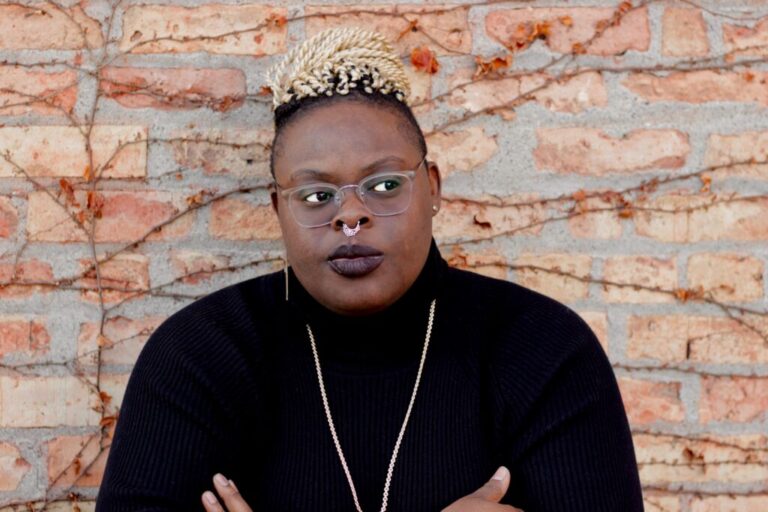When Michigan State University’s Department of Theatre was looking for someone to guest direct its production of Corktown, Or Through the Valley of Dry Bones, it looked no further than MSU’s Department of African American and African Studies (AAAS) and to Dr. Chamara Jewel Kwakye, Academic Specialist in AAAS, whose vision for the play was fueled by her own background and life experiences.
Set in Detroit’s oldest neighborhood, Corktown shines a spotlight on the harmful effects of gentrification and its impact on a community while exploring notions of home, racism, and family. Performances are scheduled for Oct. 14-23 at the Pasant Theatre in the Wharton Center for Performing Arts.

“This story was personal for me to tell. I am from South Los Angeles, born and raised, and each time I go home, my neighborhood looks completely different,” Kwakye said. “There are fewer people who look like me. And I’ve watched families disappear from my street that I’ve known my entire life. I saw a house on the street that I grew up on come up for sale for $1.5 million. I thought, ‘I will never be able to live in my neighborhood again.’”
While working on the production, Kwayke also connected on a personal level with the characters of the play and with its playwright, Jeff Augustin.
“I see so much of myself in the characters and in the playwright,” Kwayke said. “Jeff Augustin, child of Haitian immigrants, committed to communal storytelling traditions and its importance to Black diasporic survival, is in harmony with my own notions of survival, freedom, and child-of-a-Ghanaian-immigrant upbringing.”
“I am so thankful that the Department of Theatre decided to do Corktown because we don’t often get to hear from Black queer young people. It made me proud to be Black and queer.”
The Corktown story itself is told by Jackee, a precocious and quirky Black, queer, working-class 14-year-old boy who sees beauty where others have said there is none. The play centers on Jackee’s voice, his family, and the people in his neighborhood.
“I can’t think of a single show that centers the voice of a Black queer teen as narrator and storyteller. These are the narratives we don’t often get to center,” Kwayke said. “I am so thankful that the Department of Theatre decided to do Corktown because we don’t often get to hear from Black queer young people. It made me proud to be Black and queer. If I had seen Jackee as a kid, what stories would I have had the power to tell, or the things I would have had the power to do in my community and for my community.”

When the audience first meets Jackee, he is giving tours of his city and the audience becomes a guest on his tour where they see the city and what’s happening to it through Jackee’s eyes while meeting his family and other people of the city.
“It was important for me to show how everybody responds to what’s happening in the city, so we get to see it from different vantage points, but Jackee is our tour guide,” Kwakye said. “We often hear about gentrification from a larger perspective, but we don’t hear about it from the people on the ground. We see what this does to Jackee internally and what it does to the city externally.”
Kwayke says Corktown is “a universal human story that anyone can relate to.” One of the cast members told Kwayke they had never experienced gentrification, but Kwayke says that isn’t so because we’re all living on stolen land. And when we see new restaurants and coffee shops and other new establishments, we should think about who or what was displaced in order to make those things happen.
“Corktown asks us to consider if the communities we live in provide space for everyone, and every living thing, to grow and thrive or just a select few?”
“Who doesn’t get to be here anymore for this new stuff to be here,” Kwayke said. “That’s not saying that all this can’t exist, but why do people have to be pushed out for these new things to exist? Do we want more things that we can consume or do we want to be able to live with each other and have community with each other?”
The Department of Theatre’s theme for the 2022-2023 season is “community” in which the department will present productions that explore different aspects of community, including the challenges faced by communities as well as the traditions that bind people together within a community.
“I cannot imagine a timelier story and characters to exemplify the Department of Theatre’s theme of community or one that speaks directly to our contemporary moment,” Kwayke said. “Corktown asks us to consider if the communities we live in provide space for everyone, and every living thing, to grow and thrive or just a select few? My sincerest hope is that you, too, see yourself in Corktown without ever taking for granted the complex meaning of home.”

A scholar, educator, and lifetime performer, Kwakye consulted on the Department of Theatre’s production of Hit the Wall last season, which recounts the historic 1969 Stonewall Uprising. However, this is her first time at the helm of an MSU production.
“I wanted to do justice to this story on all different levels and I am so excited to see it come together,” Kwayke said. “I’m excited about what we’ve worked on, what we’ve done, seeing it go from words on the page to people embodying these characters.”
“I wanted to do justice to this story on all different levels and I am so excited to see it come together.”
Assistant Director Ural Grant is an MFA Acting Candidate and a member of the MSU Gospel Choir, which collaborated with Lucas Nunn, Professor of Sound Design and Engineering, along with MSU POE Climate and Response Specialist, LaShondra “Rynea Soul” Hemphill, to incorporate original music into the show. The choir also will give a pre-performance concert before the Sunday, October 16, performance. That concert will begin at 1:15 p.m.
Performances for Corktown, Or Through the Valley of Dry Bones will take place at the Pasant Theatre in the Wharton Center for Performing Arts. Performance dates and times are:
- Friday, Oct. 14, at 8 p.m.
- Sunday, Oct. 16, at 2 p.m.
- Tuesday, Oct. 18, at 7:30 p.m.
- Wednesday, Oct. 19, at 7:30 p.m.
- Thursday, Oct. 20, at 7:30 p.m.
- Friday, Oct. 21, at 8 p.m.
- Saturday, Oct. 22, at 2 and 8 p.m.
- Sunday, Oct. 23, at 2 p.m.
Tickets for Corktown are $23.50 for general admission, $21.50 for MSU faculty/staff and seniors, and $13.50 for students. Tickets are available online at whartoncenter.com, at the Wharton Center box office, or by calling 1-800-WHARTON.
Content Advisory: This play deals with themes of death, dying, and the afterlife; use of alcohol, profanity, and derogatory language, including use of homophobic and ableist slurs.
For more information on the show and other MSU Department of Theatre productions, visit: https://theatre.msu.edu/2022-2023-season/.
Hear more about the Corktown production in the Conversations with CAL discussion, Corktown: Bringing the story of Detroit’s oldest neighborhood to a MSU Stage.
Written by Kim Popiolek


